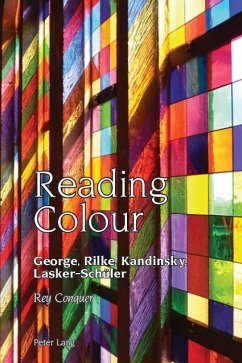Colour is a problem for poetry, where - unlike in painting, sculpture or film - it
is marked by its absence. This absence raises questions that have often been
overlooked in the study of colour: how do writers navigate the invisibility of
colour in text? What aesthetic commitments do certain attitudes to colour
expose? And how, in the face of its absence, do we read colour?
This ambitious and exciting study addresses these questions, analysing the
use of colour language in the work of Stefan George, Rainer Maria Rilke,
Wassily Kandinsky and Else Lasker-Schüler to tease out how these poets
understood poetic production, and how they negotiated the relations between
poem, reader and world. Covering the poetry, prose, translation, literary and art
criticism and theory of these and other writers central to European literature
at the turn of the twentieth century, Reading Colour sheds new light on poetic
practice of the period, but also uses colour to open up an understanding of
how poetic language works, and to ask how we read poetry.
This book was the winner of the 2018 Early Career Researcher Prize in German
Studies, a collaboration between the Institute for German Studies at the
University of Birmingham and Peter Lang.
is marked by its absence. This absence raises questions that have often been
overlooked in the study of colour: how do writers navigate the invisibility of
colour in text? What aesthetic commitments do certain attitudes to colour
expose? And how, in the face of its absence, do we read colour?
This ambitious and exciting study addresses these questions, analysing the
use of colour language in the work of Stefan George, Rainer Maria Rilke,
Wassily Kandinsky and Else Lasker-Schüler to tease out how these poets
understood poetic production, and how they negotiated the relations between
poem, reader and world. Covering the poetry, prose, translation, literary and art
criticism and theory of these and other writers central to European literature
at the turn of the twentieth century, Reading Colour sheds new light on poetic
practice of the period, but also uses colour to open up an understanding of
how poetic language works, and to ask how we read poetry.
This book was the winner of the 2018 Early Career Researcher Prize in German
Studies, a collaboration between the Institute for German Studies at the
University of Birmingham and Peter Lang.
Dieser Download kann aus rechtlichen Gründen nur mit Rechnungsadresse in A, D ausgeliefert werden.
«Reading Colour is a hugely ambitious project: in asking why and how poets write colour, Rey Conquer offers a tour de force of close reading in early twentieth-century poetry, but also tells a fascinating story about how we read poetry - indeed, how we read. Full of fascinating insights and brilliant close readings - from George's surfaces to Rilke's balance, Kandinsky's red corners and Lasker-Schüler's blue rooms - this is a stunning guide to the inner architecture of the poem from the first to the last gorgeously written page.» (Karen Leeder, Professor of Modern German Literature, Fellow of New College, Oxford)
«Rey Conquer colours the reading and writing of poetry with vivid specificity. Again and again the life of colour words in poems is shown to reveal not only how the visual fares in linguistic refraction, but also poetological truths concerning both modernism and the universal condition of poetic language.» (Michael Minden, Jesus College, Cambridge)
«Rey Conquer's Reading Colour is a unique and original study of the ways four of the twentieth-century's most gifted and influential German-speaking poets and artists (Stefan George, Rainer Maria Rilke, Wassily Kandinsky, and Else Lasker- Schüler) thought about - and through - colour in their verse. This lucid and persuasive monograph encourages us to rethink and reimagine (their) poetry in new and exciting ways.» (Nicholas Martin, Director of the Institute for German Studies, University of Birmingham)
«Rey Conquer colours the reading and writing of poetry with vivid specificity. Again and again the life of colour words in poems is shown to reveal not only how the visual fares in linguistic refraction, but also poetological truths concerning both modernism and the universal condition of poetic language.» (Michael Minden, Jesus College, Cambridge)
«Rey Conquer's Reading Colour is a unique and original study of the ways four of the twentieth-century's most gifted and influential German-speaking poets and artists (Stefan George, Rainer Maria Rilke, Wassily Kandinsky, and Else Lasker- Schüler) thought about - and through - colour in their verse. This lucid and persuasive monograph encourages us to rethink and reimagine (their) poetry in new and exciting ways.» (Nicholas Martin, Director of the Institute for German Studies, University of Birmingham)


